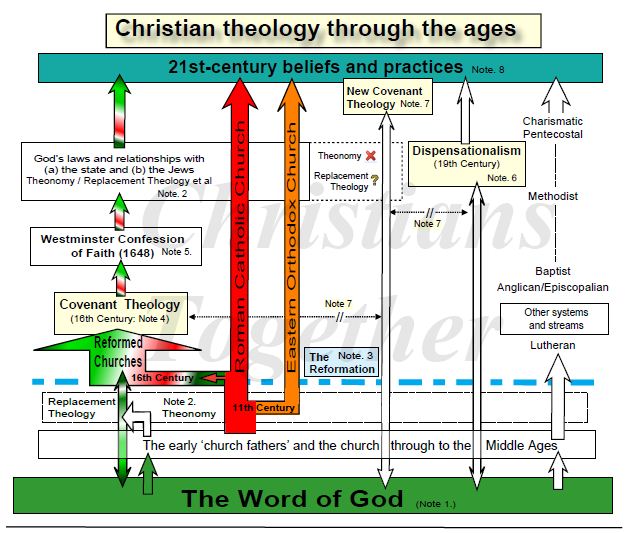|
Theology through the ages
While any church worthy of the name will place the foundation for its creeds and practices on the Word of God in practice there are very few which are not influenced – for good or ill – by the history of the Christian church.
Note: The following chart with notes is available as an A4 PDF document which can be downloaded by clicking on the image.

Note 1. The Word of God is the sure foundation and (ultimately) the only reliable base from which to formulate theology, doctrine and church practice.
Note 2. Replacement Theology sees no part whatsoever in God's prophetic end-time purposes for the nation of Israel and the Jewish people (apart from the promises of an end-time conversion - Rom 11:26-27). Theonomy teaches that it is the purpose of the church to apply God's laws (and there is debate as to which ones) to the secular state and its institutions (cf Augustine's and Calvin's 'City of God').
Note 3. The Reformation addressed and corrected many very important issues (e. g. Soteriology: salvation through faith in Christ and not the church) but it didn't correct others (e. g. Ecclesiology: retained priestcraft and clergy/laity distinctions) and abandoned important doctrines because they were being misused (e. g. confession of sin Jam. 5:16)
Note 4. Covenant Theology is not based on the covenants of the Bible but is merely a theological term which encapsulates a view that the 'church' was Israel in the OT, and is believers in the NT: accordingly the terms 'Israel' and 'the church' are synonymous and interchangeable. Based on this premise, all the prophetic passages referring to 'Israel' are (it is said) either fulfilled, no longer apply or are transferred to the church. Covenant Theology is a 'base hermeneutic' of the Westminster Confession of Faith.
Note 5. The Westminster Confession of Faith (1648) is an admixture of theology, doctrine and church laws. It carries elements of, and influences deriving from not only from the Word |
of God, but also from the theologies of the early church fathers, the Roman Catholic Church, the church in Ireland, the Reformers into the 16/17th century, and the ecclesiastical and socio-political issues of that day.
Note 6. Dispensationalism is the hermeneutic which essentially divides human history into different time periods with a different system of interpretation for each: it was developed in the 19th century. Dispensationalism is best known for its particular eschatology (of the any-moment Rapture) and less well known, for the view that the church is an 'interlude' in God's progressive plan; and will be 'taken out' of the world with the Jews left behind.
Note 7. New Covenant Theology is a recently-developed view which (as one proponent) states:
"We are not satisfied with the simple 'one covenant -- two administrations' idea of Covenant Theology. In our judgment [Covenant Theology] results in a rather 'flat' reading of Scripture which fails to appreciate the advance, the distinctively 'new' character of this Messianic age. Nor are we satisfied with the over-compartmentalizing tendency of Dispensational Theology. And so we find ourselves somewhere between the two traditional answers."
Note 8. The Western 21st-century church is mainly comprised of the Roman Catholic Church; the traditional Protestant churches which developed from the 15th-18th centuries,19th-century Dispensationalism, and the Pentecostal churches and Charismatic (neo-Pentecostal) churches from the beginning of the 20th century onward. |
|
The Editor, 04/02/2012
|
|
|
|